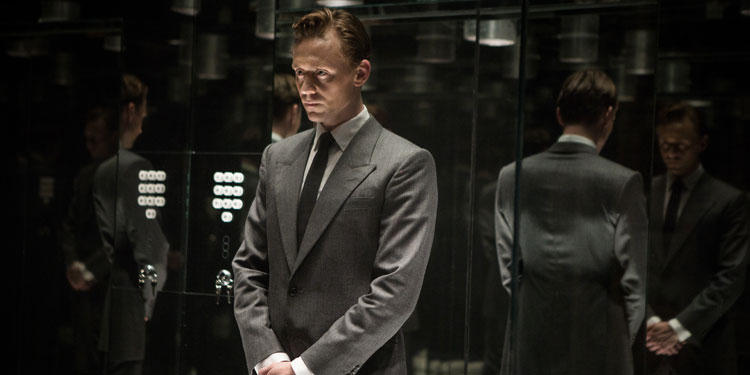 Starring: Tom Hiddleston, Sienna Miller, Jeremy Irons, Luke Evans, Elisabeth Moss
Starring: Tom Hiddleston, Sienna Miller, Jeremy Irons, Luke Evans, Elisabeth Moss
Directed By: Ben Wheatley
Running Time: 120 mins
BBFC Certificate: 15
UK Release Date: July 18th 2016 (UK)
Director Ben Wheatley was certainly ambitious when he decided to take on JG Ballard’s cult, 1975 novel, High Rise. It’s one of those books that for decades many have proclaimed unfilmable, but there’s no doubt Wheatley and his cast and crew have put their all into it.
Set in a dystopian version of the 1970s (or at least a hyper-real 1970s), Dr. Laing (Tom Hiddleston) moves into a new, high-rise tower – supposedly the pinnacle of modernist living. His apartment is on one of the middle floors, while the poorer people live near the bottom, and the higher up you go, the richer and more rarefied the people become.
It soon becomes apparent that while this self-contained microcosm of society is supposed to be an idyll, things are far from perfect. The utilities don’t work properly and with the different classes living side by side, tensions begin to rise between the different strata. Soon things have gone from merely tense to all out collapse, as the world in miniature descends into violence and absolute chaos. As Laing desperately attempts to hold on to some semblance of normality, irrespective of the death and destruction going on around him, it becomes increasingly apparent that the architect of the building, Royal (Jeremy Irons), may be completely nuts and not as in control as he thinks.
High Rise is an incredible film to look at. It’s an endless parade of visually arresting images, with the influence of Kubrick (particularly A Clockwork Orange), evidence throughout. However, it’s also the Kubrickian influence that may be its major flaw. In movies like 2001 and Clockwork Orange, Kubrick often verged towards the inexplicable and hyper-real, but always with the feeling that there was method in the madness.
High Rise tries to do a similar thing, but as the building descends ever further into chaos, the method sometimes gets lost, leaving only the madness. The whole thing is set up as a giant metaphor, but it often seems to lose track of what the metaphor is. You could read the whole thing as an indictment of the modern world and attempts to impose social engineering onto people. Alternatively, you could see it as almost the opposite, that the problem is a lack of proper leadership from the upper echelons of society, who ought to control the lower orders better, as they are one step away from turning into bestial animals.
Or perhaps it’s suggesting irrespective of class, we’re just vicious animals pretending to be something else. Or that society of any kind is a house of cards waiting for the smallest thing to set off a chain reaction that results in complete, violent breakdown. Maybe it’s that irrespective of who we are outside our private lives, inside we’re all a complete mess. A couple of scenes push towards the idea that the real issue might be patriarchal male control. Is the High Rise even real, or is it a kind of purgatory? Why doesn’t anyone leave as it becomes increasingly chaotic?
They’re all interesting ideas and the film contains plenty more, but what the movie often feels like it lacks is a kind of over-arching mind at work – the one thing that has always set Kubrick apart from nearly everyone else. Wheatley is an excellent filmmaker, and while he demonstrates (along with cinematographer Laurie Rose and the rest of the crew) an extraordinary visual control, the narrative side sometimes gets away from him.
All that said, it’s still quite an experience to watch, and while occasionally frustrating I certainly didn’t feel at the end that I’d wasted two hours of my life. That’s also partly because the cast is excellent, particularly Tom Hiddleston as Laing, and Luke Evans as working class filmmaker Wilder, whose calls to revolution go from him taking the kids to the swimming pool, to him becoming increasingly unhinged – or perhaps he’s least unhinged, as Laing suggests.
I do have a horrible feeling though that by the last 25 minutes the whole thing has completely lost that plot (except for a very good dinner scene between Royal and Laing), but it’s certainly interesting and thought-provoking.
Overall Verdict: It’s sometimes difficult to tell whether this look at a decent into chaos is just chaos itself or something far more (it might take years for a consensus on that to form), but it’s certainly something quite arresting.
Reviewer: Tim Isaac
Special Features:
Cast & Crew Interviews
Audio Commentary
‘Bringing Ballard To The Screen’ Featurette
You must be logged in to post a comment.